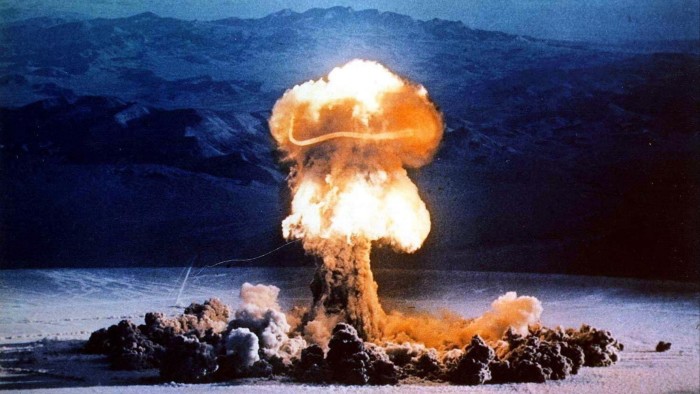Unlock the White House Watch newsletter for free
Your guide to what Trump’s second term means for Washington, business and the world
Donald Trump has doubled down on his vow to resume nuclear weapons testing in the US for the first time since 1992, raising fears of a US-led new global nuclear arms race.
“You’ll find out very soon, but we’re going to do some testing,” the president said on Air Force One as he travelled from Washington to Florida on Friday. “Other countries do it. If they’re going to do it, we’re going to do it”.
Trump sparked confusion on Wednesday when he unexpectedly announced in a Truth Social post that the US would resume nuclear testing after a 33-year hiatus just minutes before his summit with Chinese President Xi Jinping in South Korea.
Since then the president has done little to dispel the uncertainty about the administration’s intentions or rationale for the move.
A return to nuclear testing in the US would represent a huge policy U-turn for Trump, who has emphasised the importance of denuclearisation talks with both China and Russia during his second term.
Critics say it would also be unnecessary, since the Department of Energy has a programme of “stockpile stewardship” that is designed to ensure the reliability of America’s nuclear arsenal without new underground or atmospheric testing.
A resumption of US nuclear weapons testing also risks inspiring other nuclear nations to do the same, a potentially alarming scenario for global security.
 A return to nuclear testing in America would represent a huge policy U-turn for President Donald Trump © Reuters
A return to nuclear testing in America would represent a huge policy U-turn for President Donald Trump © Reuters
“If Trump succeeds in doing this, he will be opening the door to a chain reaction of nuclear testing the likes of which we have not seen in a quarter century,” said Daryl Kimball, executive director of the Arms Control Association, who describes the president’s stance as “incoherent, ill-informed and counter-productive”.
On a trip to Asia on Friday, defence secretary Pete Hegseth sought to explain the shift, saying Trump had been “clear” about his motivations and that the Pentagon and Department of Energy would be jointly implementing the test.
“We need to have a credible nuclear deterrent . . . and resuming testing is a pretty responsible, very responsible way to do that,” Hegseth said. “It makes nuclear conflict less likely if you know what you have and make sure it operates properly,” he added.
Hegseth did not offer further details, and Trump’s initial announcement, in which he said he wanted the US to resume nuclear testing on an “equal basis” with China and Russia, appeared to confuse even top military officers.
At a Senate hearing on Thursday, Vice-Admiral Richard Correll, who has been nominated to lead the US Strategic Command, which is responsible for nuclear deterrence, said he “wouldn’t presume that the president’s words meant nuclear testing”.
“Neither China or Russia has conducted a nuclear explosive test. So I’m not reading anything into it or reading anything out,” Correll said.
Rose Gottemoeller, a former US arms control negotiator who is a lecturer at Stanford University, said Trump seemed to have been “set off by [Vladimir] Putin’s bragging about the Burevestnik programme, which is related to missile testing — in this case, a missile with a nuclear propulsion system — not nuclear warhead testing”.
Any large-scale underground explosive nuclear tests would take months to set up and would likely take place at the same Nevada desert facility where the last American test occurred in 1992.
Even the possibility of testing is causing a backlash in Washington. “Donald Trump has put his own ego and authoritarian ambitions before the health and safety of Nevadans,” said Dina Titus, a Democratic member of Congress from Nevada.
“His announcement . . . not only goes against the arms control and non-proliferation treaties the US has spearheaded since the end of the cold war, it also puts Nevada and all those downwind back in the crosshairs of toxic radiation and environmental destruction.”
Gottemoeller says it is possible that Trump may step up smaller “experiments” with nuclear materials in special containers rather than large-scale underground detonations.
While the US has conducted so-called non-explosive, or “zero yield” tests, to comply with the Comprehensive Nuclear-Test-Ban Treaty of 1996 that it signed but did not ratify, Russia and China are said to have conducted tests that involved small yields — nuclear explosions with a low energy release.
“What seems likely to me is that some testing enthusiasts will push for breaching the zero-yield constraint that we have maintained over nearly three decades in the interest of ‘doing what the Russians and Chinese are already doing’ in their underground nuclear experiments,” said Goettemoeller.
Recommended
Trump’s comments may be more about seeking leverage in negotiations with China, Russia and other global powers than a firm policy shift. But they have triggered a frenzy of speculation.
“We’re in still in wait-and-see mode given Trump’s comments were ambiguous,” said James Acton, co-director of the Nuclear Policy Program at the Carnegie Endowment for International Peace.
“If the United States does test a nuclear warhead, it would almost certainly take place underground at the (formerly named) Nevada Test Site. But it’s implications would be felt much further afield. China, Russia and North Korea would almost certainly respond in kind.”


